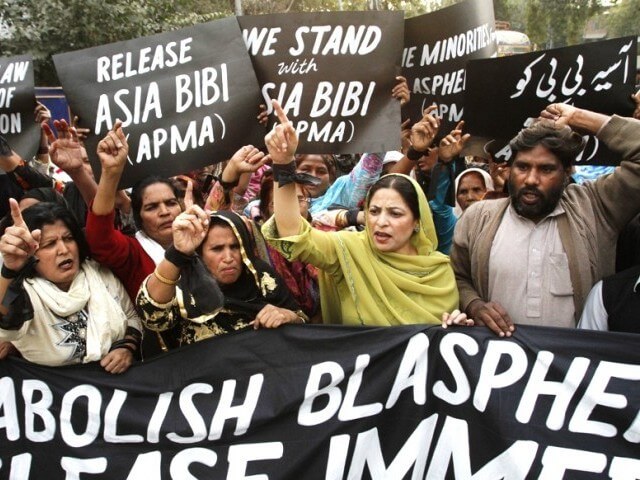Four countries where it's dangerous to criticise religion

The US State Department on Wednesday released its annual report on religious freedom around the world. One of the main concerns highlighted is laws against blasphemy and apostasy, which it says "conflict with and undermine universally recognized human rights".
In many Islamic societies, "societal passions associated with blasphemy – deadly enough in and of themselves – are abetted by a legal code that harshly penalizes blasphemy and apostasy," the report said.
"All residents of countries where laws or social norms encourage the death penalty for blasphemy are vulnerable to attacks... This is particularly true for those who have less power and are more vulnerable in those societies, like women, religious minorities, and the poor.
"False accusations, often lodged in pursuit of personal vendettas or for the personal gain of the accuser, are not uncommon. Mob violence as a result of such accusations is disturbingly common. In addition to the danger of mob violence engendered by blasphemy accusations, courts in many countries continued to hand down harsh sentences for blasphemy and apostasy, which were used to severely curtail the religious freedom of their residents."
Around a quarter of the world's countries have blasphemy laws, and more than a tenth penalise apostasy. Ambassador at large for international religious freedom, David Saperstein, said these laws are often used by governments "to intimidate [and] repress religious minorities".
He criticised the failure of governments to "prevent societal violence sparked by accusations of blasphemy and apostasy", and to hold perpetrators to justice.
"These government failures weaken trust in the rule of law, creating an atmosphere of impunity for those who would resort to violence or make false claims of blasphemy," he added.
The following four countries are highlighted in the report for their anti-blasphemy laws:
Pakistan
At least 95 per cent of the Pakistani population is Muslim, and Islam is enshrined in the constitution as the state religion. The US Commission for International Religious Freedom last year said the country represented "one of the worst situations in the world for religious freedom" and accused the Pakistani government of failing to provide adequate protections for faiths other than Islam.It argued that repressive blasphemy laws in particular are used to target religious minorities.
These laws prescribe life imprisonment for the desecration of the Qur'an and the death sentence for "defiling" the Prophet Mohammad, and accusations of incidents have often prompted mob violence. According to the Centre for Research and Security Studied in Pakistan, more than 62 people have been killed in such incidents since 1990. More than 40 people are currently on death row for blasphemy, the majority of whom are members of religious minorities.
Sudan
Sudan's criminal code criminalises apostasy, blasphemy, and conversion from Islam to another religion. Its law states that "whoever insults any religion, their rights or beliefs or sanctifications or seeks to excite feelings of contempt and disrespect against the believers thereof" will besentenced to up to six months in prison, flogging of up to 40 lashes, and/or a fine.
However, according to the State Department, the Sudanese government has only enforced this law against those it has found to be blasphemers of Islam.
In January 2015, amendments to the law meant that any non-Muslim who blasphemes against the Prophet Mohammad can now be given a prison sentence of up to five years and 40 lashes.
Saudi Arabia
The official religion of Saudi Arabia is Sunni Islam, and freedom of religion is not addressed by the law. "Calling for atheist thought", "calling into question the Islamic religion" and "sowing discord in society" are all illegal, and blasphemy against Sunni Islam is punishable by death. The government last year imprisoned a number of citizens accused of apostasy and blasphemy, violating Islamic values, insulting Islam, black magic, sorcery, and so-called "immoral activity."
In January 2015, Saudi citizen Raif Nadawi was publicly lashed 50 times on charges of "violating Islamic values, violating Sharia law, committing blasphemy, and mocking religious symbols on the internet", the State Department said.
At least two individuals were last year sentenced to death for apostasy and blasphemy in Saudi Arabia, though neither sentence has yet been carried out.
Mauritania
Of Mauriania's 3.6million population, nearly all are Sunni Muslims and Islam is designated the sole religion of both citizens and state. The tiny country situated in the Maghreb region of western North Africa criminalises apostasy, which is punishable by death.
Anti-blasphemy legislation is bound to the apostasy law, which says that Muslims may be "guilty of the crime of apostasy, either by word or by action... apparent or obvious".
Blogger Mohammad Ould MKheytir was handed the death sentence in 2014 on charges of apostasy after uploading to the internet an article considered by authorities to be blasphemous. His charges were later downgraded to that of being an "infidel" after Mkheytir apologised and said he had not meant to insult the Prophet Mohammad. His death sentence was upheld in April this year, but his case has been referred to the Supreme Court which may pardon him if his repentance is considered to be sincere.











